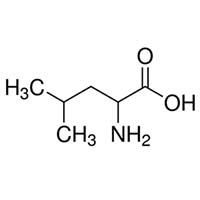Synonyms
α-Aminoisocaproic acid
(RS)-Leucine
(.+-.)-Leucine
DL-Leucin
Leucine, DL-
α-Amino-γ-methylvaleric acid
MFCD00063087
Leucine
(±)-Leucine
Pentanoic acid, 2-amino-4-methyl-
2-Amino-4-methylpentanoic acid
Leucine,DL
Product Description
DL-Leucine is a branched-chain essential amino acid that plays a vital role in protein synthesis and
muscle growth. It is widely used in both the food and chemical industries as a dietary supplement and
starting material for the synthesis of various chemicals.
In the food industry, DL-Leucine is a popular food additive and dietary supplement due to its ability to
promote muscle growth and aid in recovery after exercise. It is often used in sports nutrition products,
weight loss supplements, and infant formulas. DL-Leucine is also found naturally in many different types
of food, including meat, fish, eggs, and dairy products.
DL-Leucine is also used as a starting material in the chemical industry to synthesize various chemicals,
including pharmaceuticals, agrochemicals, and flavors. It is produced by various chemical and
biotechnological processes and is available in both powder and granular form. It is often packaged in
bulk for use in food and chemical processing.
As a food additive, DL-Leucine must meet strict safety and quality standards set by regulatory agencies.
It is important to ensure that DL-Leucine is used in appropriate amounts and under the guidance of a
healthcare professional, as overuse or high doses can cause adverse health effects, including
gastrointestinal issues and neurological symptoms.
In the chemical industry, DL-Leucine must also meet strict quality standards to ensure its efficacy and
safety. It is an important building block for the synthesis of various chemicals and pharmaceuticals,
and its production must be carefully controlled to ensure consistency and purity.
In conclusion, DL-Leucine is an essential amino acid with various applications in the food and chemical
industries. Its ability to promote muscle growth and aid in recovery, as well as its role as a building
block for the synthesis of various chemicals, make it a valuable addition to many different types of
products. As a chemical and food-grade product, DL-Leucine must meet strict safety and quality standards
to ensure its efficacy and safety.





